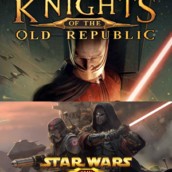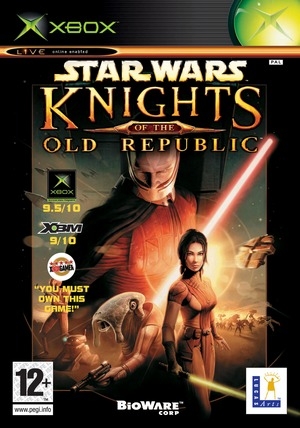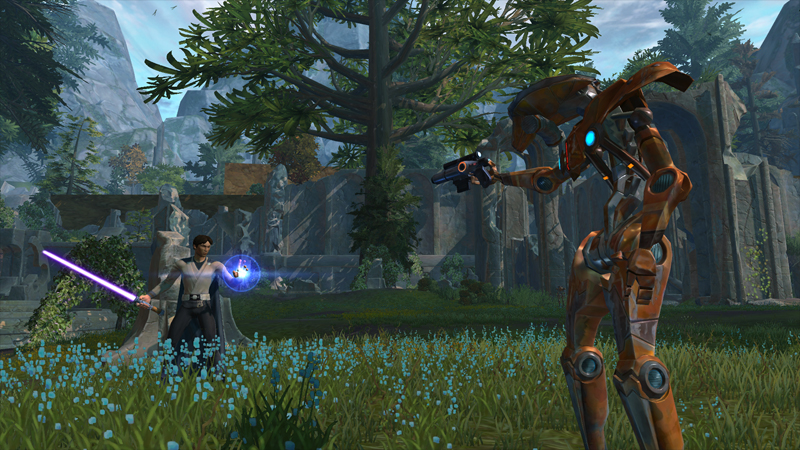Posted by Clark Kent Without Glasses in Review, RPG | 1 Comment
Star Wars: The Old Republic vs. Knights of the Old Republic

Like many geeks, I love Star Wars and I love roleplaying games. No wonder then, that the original Knights of the Old Republic is definitely in my top-three list of favorite video games. It’s rather remarkable how I can replay the game 8 years after its original release and still love every minute of it.
KOTOR 2 was, in my opinion, a bit disappointing compared to the first one. There’s no doubt KOTOR’s successor had its merits. It was backed by an impressively complex story and some of the deepest characterisations I’ve seen. Also, it explored the philosophical and moral aspects of the Jedi, the Sith and the Force in general in a thought-provoking way. Unfortunately, it was also blatantly obvious the game was simply not finished. Entire plotlines were left dangling in the air and the final few hours of the game felt like the developers were hastily trying to finish the job while the developer was calling out “Pencils down!”
And then came that long, dark time of absolute silence. Sure, there were other great roleplaying games released by studios such as Bioware, Obsidian and Bethesda, but fans of Star Wars, and of the Old Republic era in particular, were left with faint hopes and little else to cling onto.
Then, sometime around 2008, an announcement was made. Could it be true? Yes, Bioware was working on a new game set in the Old Republic era. The Old Republic would not be a singleplayer RPG like its predecessors, however. No, this one was going to be an MMORPG. I remember feeling rather unsure about that, until I heard that the developers were really stressing that this was going to be different from games like World of Warcraft, in that a deep storyline, dialogue choices and interesting NPCs were going to be a major focus of the MMO. It was going to be the first truly story-driven MMO, fully voiced by hundreds of actors. When I learned this, my enthusiasm rose again to unprecedented levels. This was going to be amazing! It sounded like a recipe for pure, glorious triumph.
The wait was long, but last December, The Old Republic was finally released to the public. Since then, I have been playing the game on and off, constantly being distracted by Skyrim. I’ve had moments of great enjoyment and moments of great frustration, but throughout the whole experience so far, I have to admit… I’ve never felt better about playing it than I did about playing KOTOR. In fact, I’ve never even felt as good about it. It’s a strange thing. I want to enjoy this game, I should enjoy it tremendously. It has all the things I love: the Star Wars lore, many planets to visit, a well-developed combat system, lots of voice acting, great storylines… So what’s wrong? Why do I hear a little voice in my head saying “you could be playing Skyrim” while I’m playing TOR? Obviously, it means Skyrim has struck a chord in me where The Old Republic didn’t quite manage to achieve that. But this entry is not about Skyrim. It’s about the Star Wars games.
So I started up KOTOR again, wondering what made that game different. A part of me was expecting to feel rather let down, assuming that my nostalgia goggles had left a much rosier impression of the original Star Wars RPG than the actual reality of it. But to my surprise, I have to say, as soon as I got into it, I fell in love again. It’s like the game hasn’t dated at all. Sure, the graphics are simplistic compared to the likes of Skyrim, but it feels so perfect. I can almost really believe I am in the Star Wars universe while playing KOTOR, which is something I just don’t feel in TOR, even though the latter is obviously superior in the graphics department.
 So what is it? What is it that makes me feel so much more attached to KOTOR? I couldn’t find the answer. And then, suddenly, as I was playing through the part again where your character has to infiltrate a hidden base and steal a prototype swoop racer engine, it hit me. What makes KOTOR so special is really the fact that it is a perfect marriage between two things I love: Star Wars and D&D. The experience of playing through KOTOR feels very much like a good campaign crafted by a creative gamemaster. And inflitrating that hidden base was a perfect example of it.
So what is it? What is it that makes me feel so much more attached to KOTOR? I couldn’t find the answer. And then, suddenly, as I was playing through the part again where your character has to infiltrate a hidden base and steal a prototype swoop racer engine, it hit me. What makes KOTOR so special is really the fact that it is a perfect marriage between two things I love: Star Wars and D&D. The experience of playing through KOTOR feels very much like a good campaign crafted by a creative gamemaster. And inflitrating that hidden base was a perfect example of it.
In the Old Republic, a similar mission would go like this: you meet an NPC and have a conversation with them. These conversation scenes are, in my opinion, really well done and actually the parts of the game I generally enjoy the most. But once the conversation is over, the actual quests are always the same. They are MMO quests. You go to the “hidden base” which usually isn’t so hidden because very often other players will be running around there as well, and you slay lots and lots and lots of respawning NPCs. Sometimes you need an item that you may find on a dead NPC or on the ground, other times you may have to turn off a computer console, destroy an insect nest or repair a broken device. Doing those things, however, consists of nothing more than clicking the item in question as soon as you have killed all nearby enemies and before they respawn again. And that’s pretty much it.
Contrast that to the experience of infiltrating said base in KOTOR. First, our party had to get past a huge rancor monster, far too powerful for us to kill. To do this, one character activates stealth mode and sneaks to the rancor’s fodder, adding synthesized odor and a frag grenade to the pile. The rancor then eats the frag grenade and it explodes inside of him. The beast is dead! We now enter the base. There are several locations, doors that can be opened using the security skill, computer consoles that provide camera access to hidden rooms, allowing a player with enough computer skill to sabotage systems or repurpose laser turrets to target the enemy. There are a number of combat encounters with small groups of enemies and at one point we meet a woman who was held hostage by the gang that resides here. Along the way, there are various chests to loot, containing cool items, and at the end of the “dungeon” there is an encounter with a mini-boss and the quest ends. Right after that, the story continues. And so the plot is always in motion, propelled by the player’s actions.
This is very much the way I try to design dungeons when I run our D&D game. There’s a versatility to it. It’s not just “fight fight fight, activate, loot, run, fight fight fight, loot, run, fight”. And key to the immersion of this experience is feeling that you, the player, are in fact the hero or heroine. You are the person changing history throughout the galaxy. TOR tries its best to make you feel the same way, but it becomes hard to believe it when you are constantly seeing and interacting with other players, all of whom are equally great heroes in their own little world. There is a certain abstraction to the MMO way of doing things and it shows in many small details. A group of enemies ten feet away will not attack in TOR. In fact, they’ll stand around twisting their thumbs while you destroy their hideout and kill their comrades. It has to work this way, because there are other players around and there is a certain flow to the gameplay. I understand it could hardly be different and still be an MMO. But I can’t help but feel disappointed every time when an interesting story conversation gets me in the mood and then the actual gameplay that follows is so explicitly… “game-y”. I honestly applaud Bioware’s achievements in The Old Republic. The game does a lot to further the cause of interactive storytelling in multiplayer games. But it’s no KOTOR, nor could it ever be, simply because of its very nature as an MMO.
Still, it makes me wonder what KOTOR 3 might have been like…

feel the same way- it misses the skills of a D&D game, gone are the times when our dialogue is influenced by our extreme knowledge of computer skills or such. I arrived to the same conclusion that the game needs to be more D&D like (More flashpoints) and less MMO like (spoiling the companions we get, same exact heroes running around)… the MMO takes us out of the illusion of the game. The D&D immerses us in.